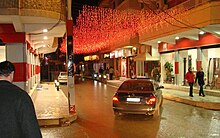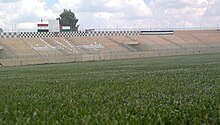Qamishli
[10] The city was initially a small village inhabited by Assyrians called ܒܝܬ ܙܠܝ̈ܢ (Bēṯ Zālīn) meaning "House of Reeds".
The city dates back to the 1920s, when a sizable amount of Assyrians, escaping the Assyrian genocide carried out by the Ottoman Empire, fled from northwestern Iran and southern Turkey and built a small town, under the French Mandate authorities, which they initially called Bet-Zalin.
[11] One of the most important funders of the early development projects in the city was Masoud Asfar, an Assyrian who survived the Massacres of Diyarbakır (1895) as a young child.
Throughout the 1920s–1940s, the Asfar & Najjar Corporation funded hospitals, Assyrian schools, and churches throughout the city.
At the same time, many Armenians and Assyrians, fleeing persecution in Iraq and Turkey, moved into the region.
[14][15] In March 2008, according to Human Rights Watch,[16] three more Kurds were killed when Syrian security forces opened fire on people celebrating the spring festival of Newroz.
With the civil war and the Rojava conflict from 2011, the city grew into a major political role, being the de facto capital of the AANES.
Part of the city, as well as an area to the south which includes Qamishli Airport, remained under the administration of the Syrian government until the rebel offensive in December 2024.
[21] In 1939, French mandate authorities reported the following population numbers for different ethnic/religious groups in Qamishli city centre.
[34] The current town was founded in 1926 by the French Mandate, which following encouraged the settlement of the population in Nusaybin, which is located just across the border.
[7] While prior to the Rojava conflict, there had been no institution of higher education in northeastern Syria, in September 2014 the Mesopotamian Social Sciences Academy started teaching.
The University of Rojava initially comprised four faculties: Medicine, Engineering, Sciences, and Arts and Humanities.
Programs taught include health, oil, computer and agricultural engineering, physics, chemistry, history, psychology, geography, mathematics, primary school teaching, and Kurdish literature.
[38][39] Al-Jihad SC is the largest football club in the city and plays at 7 April Stadium.




